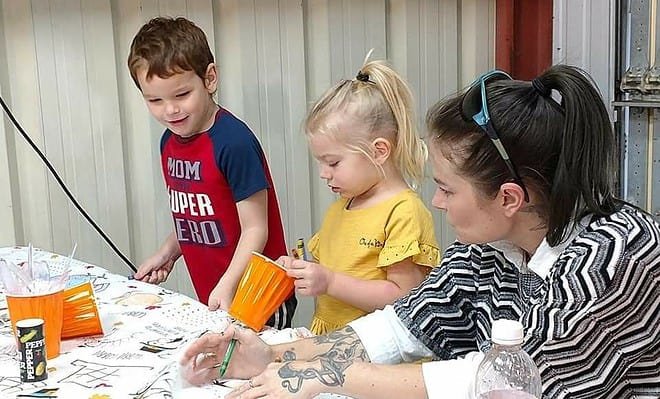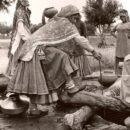Colorful Marbles and Holy Water

Tulsi Bhua (aunt) is beside herself. She cannot find her Gangajali (a receptacle for holy water). Mummy is helping her search; it cannot just disappear. It is not a tiny thing that can fall through cracks. It is heavy, silvery, and shining, with a latched lid. And it holds the holy water from the river Ganga; sanctified and sacred. It cannot just vanish into thin air! The entire kitchen, nay, the whole house has been turned upside down looking for it.
Mummy has questioned the help, Laxmi, who is commiserating with a tearful sobbing Tulsi Bhua! As a last resort, Mummy now turns her attention to the two of us, Sudhir and me. Since I am the older one, she looks at me worriedly and asks if I have seen the Gangajali anywhere. I look at Bhua and Mummy and sadly shake my head. “No, I have not seen it,” Mummy asks the four-year-old, Sudhir. Head bowed, he does not look up but steals a look at Bhua and then at Mummy. Oh! Oh!
Mummy now knows exactly where to look. Sudhir has two assigned shelves in our toy cupboard, and Mummy, kneeling in front of them, is taking out his toys one at a time. And lo and behold, there is the Gangajaji! Mummy reaches for it. It rattles. No splashing sounds! Oh! Oh!
Unbelieving yet suspecting, she lifts the latch and the lid. It is full of Sudhir’s precious collection of colored marbles. Not holy water! Not even a dampness from the holy water.
Mummy is aghast, and Bhua, looking over Mummy’s shoulders, is having a difficult time breathing. Tears and deep silent sobs. But, not a look or word of reproach to Sudhir. Mummy tries to explain to a four-year-old the enormity of his actions. Puzzled protests ensue at the fuss over some water. He glances at Bhua and is confused by her desolate face. That night Sudhir sleeps with the Gangajali next to his pillow, the marbles rattling every time he checks on it.
A little about Tulsi Bhua; Daddy’s ancient aunt. She finds herself penniless and homeless, having lost everything during the Partition—Britannica’s parting shot leaving India. It is whispered at the age of seventy; she has walked most of the way from the newly-constituted Pakistan to Delhi in search of her nephew. She is one among the millions of displaced persons. She has no idea where we live – all she knows is her nephew is a Tuberculosis doctor in Delhi. The good Samaritan social workers bring her to the New Delhi TB Center, where Daddy is the Epidemiologist. Although she has two married daughters, Rukman and Hukman, living in other towns, it is unthinkable for Bhua to seek their help. They have been given away in marriage, and one does not accept an iota from those who are no longer yours. And Daddy is the next best thing to a son of her own! Her own brother’s motherless boy whom she has helped raise!
It does not take long for Tulsi Bhua to become a fixture in our house. She helps Mummy mainly in the kitchen, washing, peeling, chopping vegetables, and cooking. She also observes her own rituals and restrictions, with a greater vengeance, when she becomes aware of Mummy’s resentment towards some of her practices. She does not sit at the table with us, preferring to eat in the kitchen, and will not eat from dishes in which eggs and meat are cooked or served. A deeply devout woman, she is up before dawn every day and takes a cold bath, summer and winter, amidst much clanking of pails and shivering murmurs of Hari-Oms and Wahe Gurus (salutations to the Supreme Power). And then, she walks to the Gurudwara (temple of the Sikh faith) to attend the early morning service.
She returns home with a small lump of prasad (sacrament of sweet semolina halva) tucked in the palm of her hand. Sudhir and I are waiting at the top of the stairs for the sweet offering. Tulsi Bhua splits the sacred offering into two tiny lumps for the two of us. One lump is barely but perceptibly bigger than the other. Invariably this goes to Sudhir. My bitter complaints are unheeded for the most part, but occasionally Mummy or Daddy has to step in. After a while, I seem to be getting the bigger lump. It pleases me no end, but the quiet look on Sudhir’s face leaves me a tad uncomfortable. But, no matter, I am getting the bigger share!
Years later, overhearing bits and pieces of regaling conversations, I piece together the deception. Tulsi Bhua has started holding back a tiny portion of the halva before dividing the rest between the two of us! Needless to say, Sudhir is her pride and joy. She adores him with a passion. And Sudhir returns that adoration in full measure. A very special bond!
But I digress.
Tulsi Bhua has long wished to go on a pilgrimage to Hardwar, the sacred city by the Ganges nestling in the foothills of the Himalayas. Sudhir and I have already visited it with Mummy and Daddy. I still remember swimming in the swift waters of the Ganges, teaming with fish around our kicking feet and legs as Daddy holds on to us by our outstretched arms.
Across from our flat in Delhi lives a young couple, along with the husband’s mother. Tulsi Bhua and the young man’s mother are friends of a sort, on occasion going to the Gurudwara together. Tulsi Bhua has a superior attitude toward her friend, who she deems not as pious as herself. The number of times she misses the early morning service or goes unbathed, uncleansed to the Gurudwara is a good measure of her lack of piety. And eating from the same dishes as her non-vegetarian son. Toba! Toba! (an expression of penitence). Her saving grace is her daughter-in-law, who, unlike Mummy, is a strict vegetarian yet dutiful enough to fix eggs for her husband without partaking in these herself.
This young man has been making inquiries on sponsored pilgrimages to Hardwar for his mother. Tulsi Bhua’s friend shares this with her as a testimonial of her devoutness. That’s all it takes! Tulsi Bhua is now on a mission sparing no opportunity to bring this up with Daddy. Daddy has no rest until he talks to the young man, and Tulsi Bhua and her friend are set for their pilgrimage. Daddy mentions to Bhua that he is now beholden to the young man. He also suggests to Bhua, as tactfully as only Daddy can, that she should try to get along better with her friend, at least while on the trip. Daddy tries coaching Bhua on having a less superior attitude towards her friend. Bhua nods solemnly. But like they say—not easy to teach an old dog new tricks!
Bhua returns happily from her trip, ecstatic, having bathed in the sacred Ganges, and, with Wahe Guru’s grace, has been absolved of all her sins. She has also brought back a beautiful silvered Gangajali filled with the holy waters of the Ganges. It has a pretty hinged lid with a little clasp, so it can also be locked.
Tulsi Bhua has few possessions in this world other than a couple of changes of clothing and a few hooped gold earrings she no longer wears. Her ears have several piercings, from the lobe up along the edge to the helix. The size of these piercings are ample testimony to the weight of the earrings and how much these were worn once. This little bit of gold and the Gangajali are her prized possessions. Every day, after her bath, she consumes a few drops of the sacred waters.
A few weeks later, Sudhir stumbles upon the Gangajali and, being the curious little boy he is, releases the clasp and flips open the hinged lid. There is nothing in it except water, and he knows he can put it to much better use. The sanctified waters go down the drain, and the inside wiped dry. And all the pretty, patterned, colorful marbles are transferred from the battered shoebox into the Gangajali. It’s a sizeable collection that has grown even as Sudhir’s marksmanship and dexterity of the finer points of the game improve—all in the four-year-old category.
And now the missing Gangajali has been found!
Little by little, Sudhir understands his actions have hurt his beloved Bhua very deeply. Although he still does not comprehend why! He avoids her, no eye-contact other than furtive cautious glances at her sad tear-stained face. Sudhir is puzzled and miserable and almost as devastated as Bhua.
One morning Bhua is late returning from the Gurudwara. Mummy and Daddy are worried. Not sure if Bhua’s friend has returned as yet either. Sudhir, sensitive to worry, is perched on a charpoy in the verandah, eyes sweeping the street for Bhua. Mummy and Daddy keep an eye on him, tottering on the charpoy. After a long while, Sudhir spots Bhua as she turns the corner with her friend. He shouts and rushes down the stairs as fast as his little legs can carry him, with me racing behind him. Down the stairs and down the street, stumbling straight into Bhua’s outstretched arms. Bhua plants all the prasad in Sudhir’s mouth and hugs him close, tears running down her wrinkled beaming cheeks.
Daddy asks Bhua why she is late. She shakes her head and does not say anything. From her friend, Mummy gathers the details. Word has gotten around the Gurudwara that Tulsi is very upset. No one knows why not even her friend. The priest at the Gurudwara, venerable and revered, stops by Bhua, inquiring if everything is okay. The floodgates open, and unhappily Bhua reveals the fate of her Gangajali. Between sobs, Bhua shares how much she adores the little boy and how lovingly he responds to her with all the passion of his little heart. But now she has lost all the blessings of her pilgrimage. The priest nods solemnly in deep sympathy. He heaves a deep sigh and asks Tulsi Bhua to keep the faith. Breaking into a hesitant but reassuring smile, he tells her Wahe Guru is enjoying Sudhir’s childish antics and is joyfully watching him play with the marbles and the Gangajali – “Wahe Guru bada anand le re ne.” Bhua is somewhat reassured and comforted. And for once, I have forgotten to complain about Sudhir getting the entire prasad.
But Tulsi Bhua does not forget! She offers to take me to the Gurudwara someday so I could get all the prasad for myself. I pipe up. How about next Saturday? It’s not a school day, and Mummy and daddy are agreeable. I am up early Saturday morning and ready with a quick change of clothes. No early morning showers for me. Bhua clutches my hand firmly, and we walk swiftly to the Gurudwara. I sit next to Bhua cross-legged on the carpet, quiet as a mouse, and watch the priest read, recite, and explain long conceptual passages from the Holy Book. I am fascinated by the slow swishing of a switch with a bushy hairy end. I nudge Bhua, pointing to it, and she whispers, “It’s called the Chaur Sahib.”
And I wait patiently for the prasad to be distributed. It is being distributed now, but somehow, I am overlooked in the throng. I look up at Bhua and, with a finger to her lips, she takes my hand and makes her way to the attendant distributing the prasad. She holds my open palm in front of him and requests, “Bhaiji (brother), please, a bit of prasad for this little girl.” Bhaiji complies with a smile. Before leaving the premises, Bhua kneels in front of the Guru Granth Sahib (the Holy Book) and touches her forehead to the floor. I follow suit, mimicking Bhua’s actions. We are blessed!








